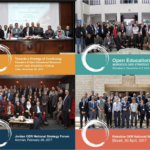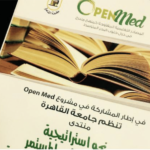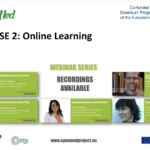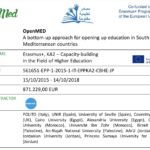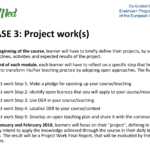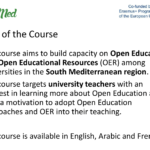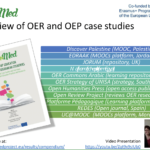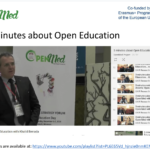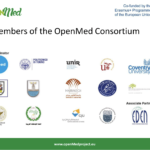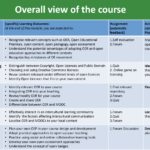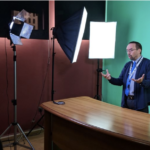OpenMed Open Education & Resources for Higher Education
Open Education for South Mediterranean countries
Open Educational Resources and Practices are increasingly being leveraged to facilitate cost-effective and equitable access to quality higher education in countries where demand exceeds existing capacity. For learners in the South Mediterranean, this approach is breaking new virtual ground beyond campus walls.
Thanks to the wonders of technology and open learning, five European universities have joined nine of their peers in four Arab Mediterranean countries, Egypt, Morocco, Jordan and Palestine, to launch OpenMed, an innovative cooperative project that is creating new virtual frontiers for delivering higher education.
The idea behind this joint venture is to raise awareness around open education, expanding its adoption to bring disadvantaged groups such as low income and disabled, rural and refugee students, into the circle of advanced learning with reputable institutions providing technology-enhanced coursework. To get the ball rolling, OpenMed partners created an OER Regional Agenda, which served as a blueprint for those institutions in the South Mediterranean to use in building their own open education initiatives.
They also developed a network of on-ground Innovation Centers equipped with a variety of digital tools and technologies for collaborative experimentation along with training modules for educators around open education principles and strategies that support proven approaches for effective learning across any mode of delivery. And using best practices and models for teaching and learning, instructors, designers and students work together through intentional communities of practice to assemble freely available educational resources into flexible and culturally competent academic opportunities that can be delivered online.
For example, Discover Palestine is an English language MOOC about Palestinian history and archeology, culture and heritage while Jorum is an online open educational repository that currently houses more than 16,000 academic resources, including full courses.
Transformative efforts, such as this one, are ultimately aimed at discovering far better ways of developing, adapting and sharing OER. Indeed, they empower us to override intellectual property concerns create knowledge-specific and globally relevant content, as needed and promote new communities of production. For these Arab Mediterranean university systems, OpenMed is paving the way for them to extend their reach, while also enhancing their academic offerings to reflect global educational perspectives that will play a significant role in supporting their countries’ economic future on the world stage.
When one first hears of OpenMed, It is natural to assume it must have something to do with the medical industry but this is not the case with this international project.
Rather than a medical focus, OpenMed is so named due to the region of the world the project serves. The work they are doing, however, will not only serve the South-Mediterranean countries in their region but is having a global reach.
The Demand for Open Education Resources and Practices
In the South-Mediterranean countries the demand of Higher Education often exceeds capacity in the existing HE system. Using and integrating Open Educational Resources (OER) and Open Educational Practices (OEP) are possible ways to facilitate learners’ access to the university.. Widening participation to higher education by means of OER adoption is indeed a strategic priority that promotes equity, inclusion and democratization of higher education.
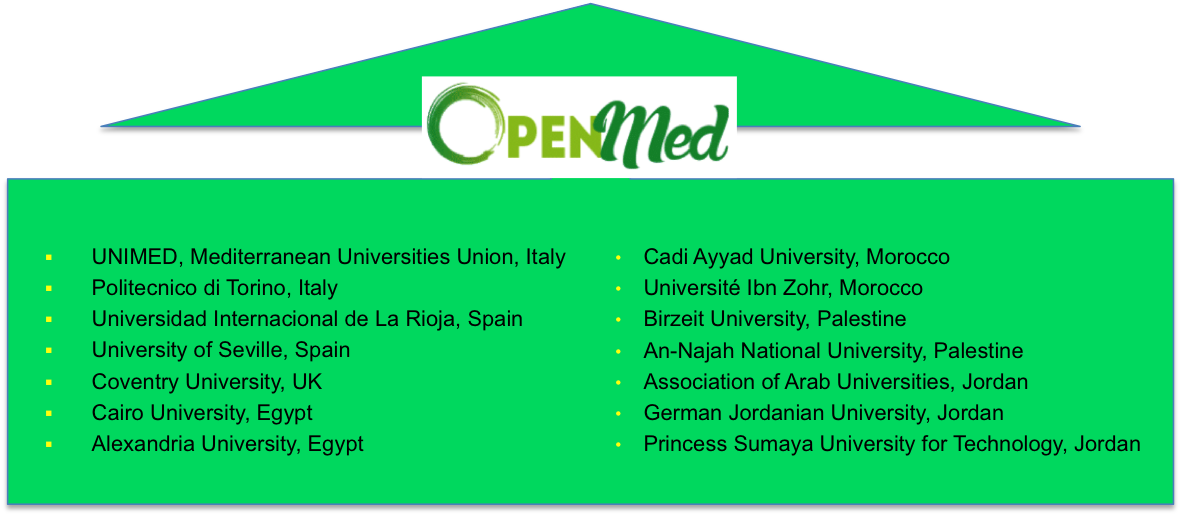 The OpenMed project is an international cooperation project between five European institutions and nine institutions with Mediterranean with Universities Union in Italy (UNIMED) serving as coordinator. It is co-funded by the Erasmus+ programme of the European Union that is currently ongoing.
The OpenMed project is an international cooperation project between five European institutions and nine institutions with Mediterranean with Universities Union in Italy (UNIMED) serving as coordinator. It is co-funded by the Erasmus+ programme of the European Union that is currently ongoing.
OER Initiatives Provide Accessibility
OpenMed fosters the role of universities as knowledge providers not only to their on-campus students but also beyond the walls of institutions, especially towards disadvantaged groups (e.g. low income peoples, disabled students, people living in rural areas, learners at risk of low achievement, refugees).
Opening up education can truly change Higher Education and make it better, accessible, and more relevant. Sharing information about OER initiatives can inspire others to reflect, develop their own initiatives, make connections, celebrate diversity, and work together to defend education as a public good and a basic human right.
With the idea to promote open approaches to knowledge projection within education, OpenMed encourages the use of open licenses for all educational materials produced by public institutions.
By promoting adoption of open standards (open source), this consortium has been able to address accessibility principles whilst using bibliometric criteria (Metadata) when publishing.
OER Project Outcomes Producing Excellent Resources
The first phase of OpenMed has involved a review of good practices in Open Education globally and in particular the South-Mediterranean region. A Compendium of case studies[1] has been created and complemented by interviews with international experts in the field. A baseline survey outlines the level of participation in Open Education within the partner institutions and captures current practice at the time of completion (early 2016). It helped identify the future goals for the participating institutions.
International experts provided important insight into the individual case studies, and helped to shape the 22 recommendations made for the continued improvement of open education practices and resources. These recommendations were categorized under the following five themes: i) Top-down and bottom-up implementation; ii) Supporting staff in using and integrating open practices and open resources; iii) Collaborative creation in communities of practice; iv) Enhancing the quality of student learning; v) Licensing of OER content.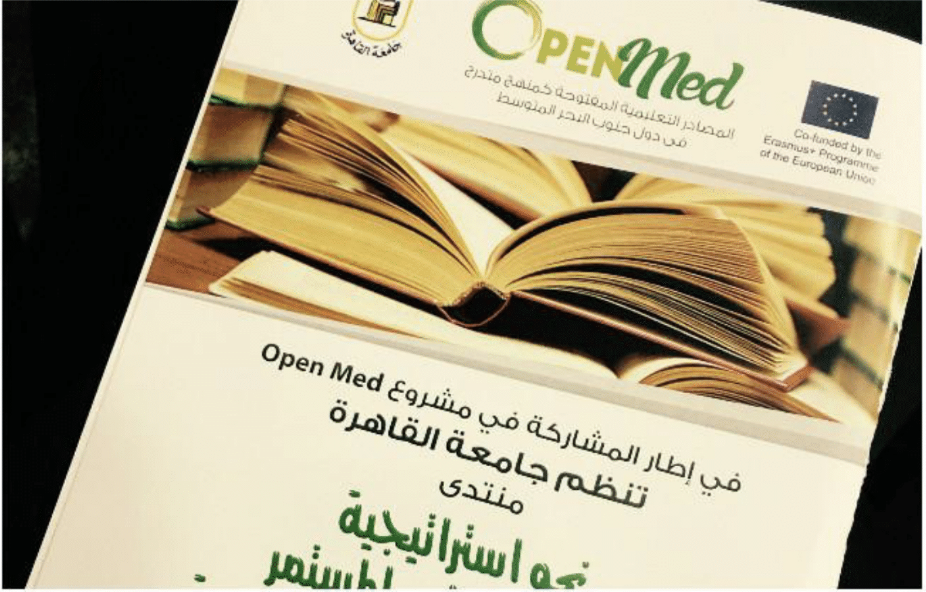
Based on this reliable and evidence-based body of knowledge, OpenMed fostered a multi-stakeholder regional debate about what are the best strategies to embed openness in universities in the South Mediterranean. Taking into account the specific needs and insights of the academic communities of these countries, this debate involved higher education managers, decision-makers, educators and other members of staff (e.g. university librarians, technical IT staff) from universities in the region as well as policy makers.
The debate revolved around the OpenMed OER Regional Agenda for the South-Mediterranean, a set of strategic actions aimed at maximising the benefits of OER and OEP to increase the access, the quality and the equity of HE in the region. This serves as a blueprint for universities in the South-Mediterranean to build-up their own Open Education strategies. Four OER Policy Forums were organized to discuss strategy.
The project also equipped physical centers, called “Innovation Center for Open Education”, at the premises of each of the 8 partner universities in Egypt, Morocco, Palestine and Jordan. The centers are intended to be open and collaborative physical spaces available for experimentation.
Open Education Fundamentals & Practices Training Course
Finally, a training of trainers course, “Open Education: fundamentals and approaches: A learning journey opening up teaching in higher education” was developed to support educators at the partner universities in implementing their institutional roadmaps and open up their teaching practices. The pilot phase of the course has recently been completed.
Open Education represents transparency, equity, democracy and participation. Widening participation and build capacity in Open Education in the South-Mediterranean will indeed lead to a stronger integration of the higher education systems.
The use of OER can guarantee a higher accessibility to higher education while diversifying the channels and means to learn.
OpenMed aims to ensure that the Mediterranean university systems are better integrated into global academic and scientific cooperation networks, which is an essential factor in the integration of Mediterranean communities and economies.


